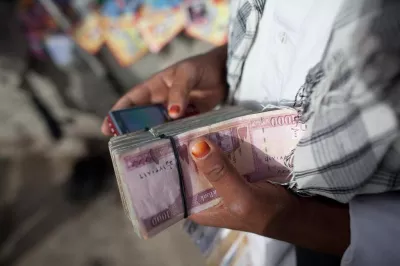
ISLAMABAD, Dec 05 (INP-WealthPK) – The illegal remittance issue has plagued Pakistan for a long time putting pressure on the current account deficit.
Speaking to WealthPK, Dr. Sajid Amin Javed, Deputy Executive Director at the Sustainable Development Policy Institute (SDPI), said the government was required to strictly implement long-lasting policies to counter the Hawala-Hundi operators who work illegally.
According to a report of the State Bank of Pakistan (SBP), the foreign exchange inflows associated with overseas Pakistanis sending money home hit an eight-month low of $2.22 billion in October, as reportedly they used unauthorized routes to send money home in order to get better exchange rates. The SBP is cracking down on unauthorized foreign exchange dealers and traders nationwide.
Dr. Amin said, “The illegal inflow of remittances puts a bad effect on the current account of the country. This leads to the current account deficit, which worsens the country’s economic situation.”
He added that the government should lower the cost of transactions through official channels because expatriates prefer to use those channels that are more affordable. Once the transaction cost has been sufficiently decreased to be closer to the unauthorized routes, the expatriates more likely will move towards the official channels.
Amin emphasized that the government should be concerned about the declining trend in remittances. The remittances collected by the countries aid in reducing the current account deficits, stabilizing currencies, and repayment of overseas debts.
According to a research by the Pakistan Institute of Development Economics (PIDE), a sizable portion of remittances flows through unauthorized channels, which is almost equal to 50% of the official channels.
Besides low-cost transactions, faster modes of transaction are also necessary to be adopted. The transactions complete far more quickly in unauthorised modes than the authorised modes. A transaction can be finished through unofficial methods in just a few hours. On the other side, it takes several days to get the money through the right channels.
Dr. Amin said although the SBP has taken some steps to enhance the mode of transaction, still there is a space that needs to be filled. For remote areas, it is more difficult to adopt the authorized route than the unauthorized route for the purpose of remittances because the unauthorized channels work faster than the official channels.
Amin said the most important factor that needs to be resolved is the difference between the exchange rate of inter-bank and open market rates. The open market offers a higher exchange rate as compared to the interbank exchange rate so the expatriates prefer unauthorized channels as its turnout is more than the interbank. He suggested that the price of dollar should not be lowered forcibly.
Dr. Amin said the government should stop the influence of speculators to tackle the current account deficit issue.
‘’The government is already working to overcome the current account deficit and has taken positive steps. Remittances have a greater impact on the current account deficit and currency stabilization. Sustainable policies should be adopted so that the expatriates adopt the official channels to send the remittances home,’’ said Amin.


































































































